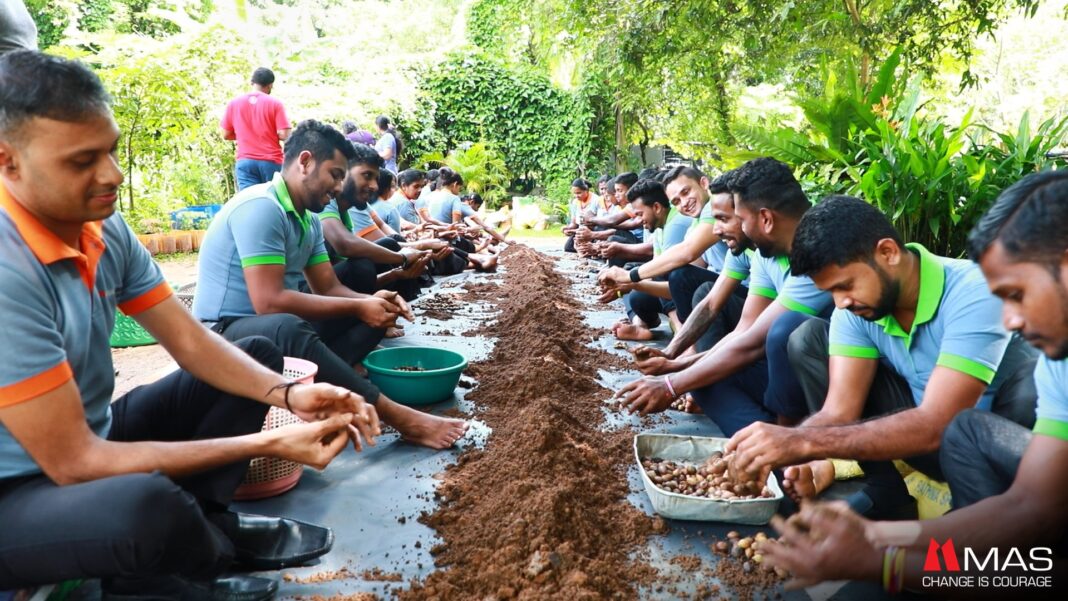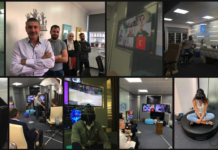‘Plan For Change’ outlines three focus areas and twelve commitments including science-based targets.
Colombo, Sri Lanka
MAS Holdings, the Sri Lankan based design to delivery solutions provider, has announced its company-wide sustainability strategy, the MAS Plan For Change. Knowing it operates in an industry with a large negative impact, The Plan For Change outlines three focus areas to improve its operations: Product, Lives, and Planet, with twelve goals to be achieved by 2025.
MAS has also recently signed up for the Science Based Targets initiative (SBTi) with commitments to reduce absolute scope 1 and 2 GHG emissions 25.2% by 2025 from a 2019 base year, and further commits that 85% of its suppliers by spend and 100% of joint ventures in scope 3 investments, will have science-based targets by 2025. The Plan For Change is a commitment to inspiring sustainable change within its operations, amongst its customers, communities, and for the planet as a whole.
MAS Holdings is the largest apparel tech company in South Asia, headquartered in Colombo, Sri Lanka with facilities in 15 countries, powered by over 100,000 employees globally.
Since its founding in 1987, MAS has prioritized employee wellbeing based on a founding principle of doing the right thing and providing safe, secure, and comfortable places of work, with fair, equitable wages for team members. This core principle percolates to all areas of business, including the relationships built with brand customers, work in local communities, the ethical treatment of people, and actions towards the natural environment.
Over three decades, MAS created many programs and initiatives aimed at improving workers’ lives, the products it makes, and the planet. MAS acknowledges that the industry it operates in has significant negative impacts and it is doing its part to mitigate these effects. The Plan For Change combines the work of these individual programs and formalises the goals into one cohesive strategy to be carried out across the group.
While the Plan For Change is a new strategic approach to the company’s product, social and environmental goals, MAS has been dedicated to uplifting people and the planet since its inception. Progress towards sustainability is an ongoing journey for the company and is demonstrated by its long-standing membership in the UN Global Compact (since 2003), signing of the Women’s Empowerment Principles, commitment to reaching many of the UN Sustainable Development Goals, and partnerships with the IFC, SAC, ZDHC and many others. MAS recognizes that addressing many of the challenges the world and its inhabitants face requires sustainable, systemic change and is committed to doing so through ambitious, collaborative initiatives.
“Whether it be climate disasters, overconsumption, inequality, wars, and pandemics, we have witnessed how prolonged, unchecked human activity has negatively impacted our industry and our world. That is why we have established this Plan as the blueprint to create positive change; and we are inspired by these ambitious goals that we have set for ourselves. Achieving them will require unprecedented levels of innovation, collaboration, and alignment among our businesses, partners, and supply chain. We are excited to embrace this challenge and hope to create impactful change. We know that the road is long and will challenge us, but just as our founders were, we are committed to staying the course of doing the right thing,” commented Sid Amalean, Head of Sustainable Business, MAS Holdings.
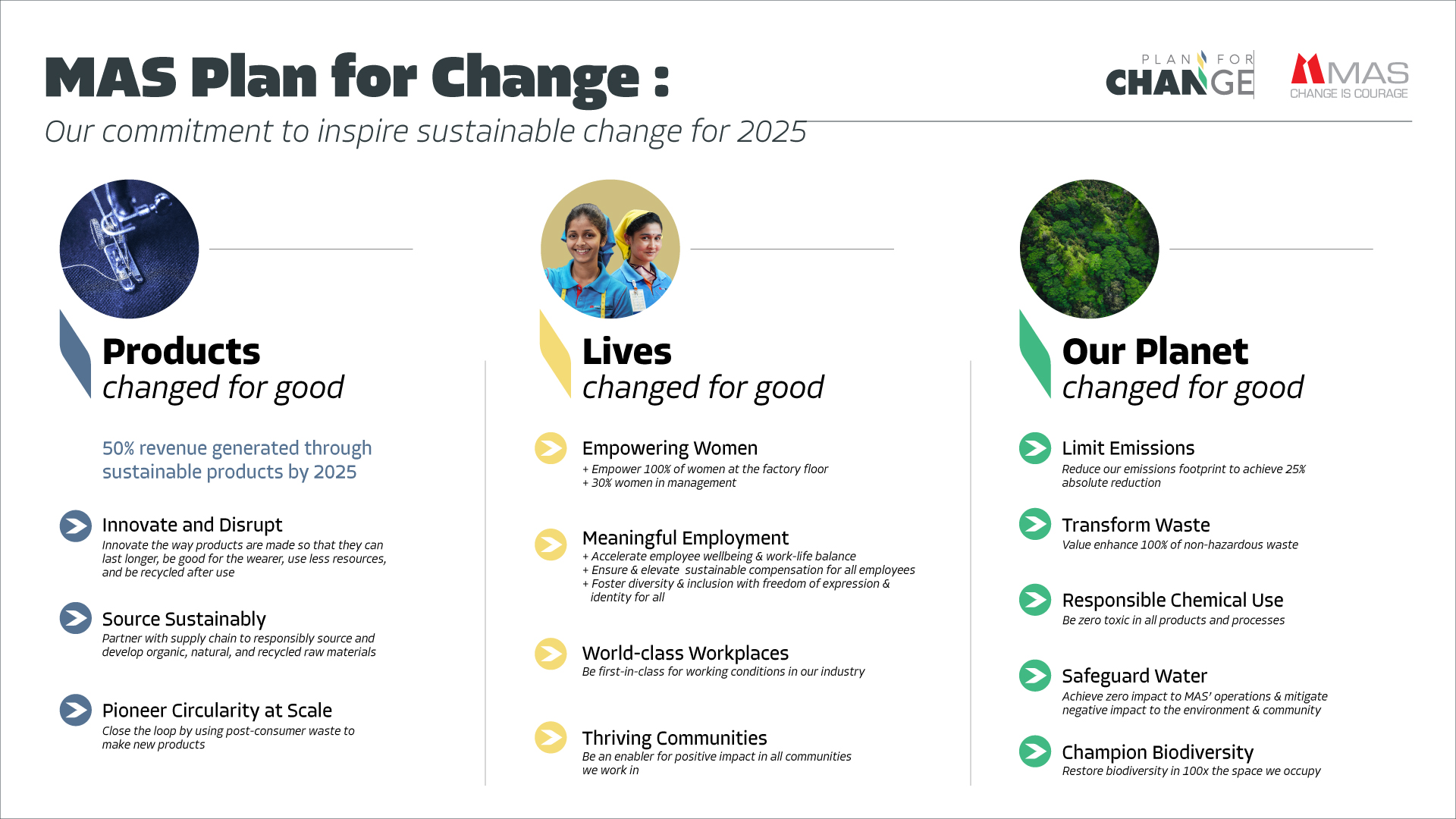
Products
With a focus on innovation, sourcing sustainably, and pioneering circularity at scale, MAS aims to increase its sustainable product offerings to 50% of its revenue by 2025. Improving products to make them last longer, use fewer resources, and be recycled after use are at the core of the strategy to produce quality goods to combat disposability.
Attention to sustainable sourcing will be achieved by partnering with MAS’ supply chain to select sustainable alternatives to raw materials. Progress towards realizing this goal has already been demonstrated through its partnership with Eco Spindles to create the Sri Lankan Cricket World Cup jerseys from discarded PET in 2019, 2020, and 2021. In 2020 alone, MAS companies recycled over 21 million plastic bottles to create fabric for its customers. Closing the loop on circular production is paramount for MAS, and strategic partnerships are key for it to achieve this goal.
Lives
Understanding that its employees and the local communities are its greatest assets, MAS aims to empower women, provide meaningful employment, world-class workplaces and enable positive impact to create thriving communities.
To support the largely female population in the workplace (70%) MAS launched Women Go Beyond in 2003, a robust portfolio of programs to prevent gender-based violence, empower, educate, provide skill development, leadership development, and career advancement for women. Women Go Beyond is MAS’ hallmark female empowerment platform that adheres to the UN Women’s Empowerment Principles; since its inception in 2003, Women Go Beyond has created 3.7 million opportunities for women within MAS and its communities. To support mothers, MAS offers pre-and post-natal programs, on/off-site childcare facilities, and lactation rooms among other benefits. Through these programs, MAS aims to empower 100% of women on the factory floor and increase gender representation in management to 30% by 2025.
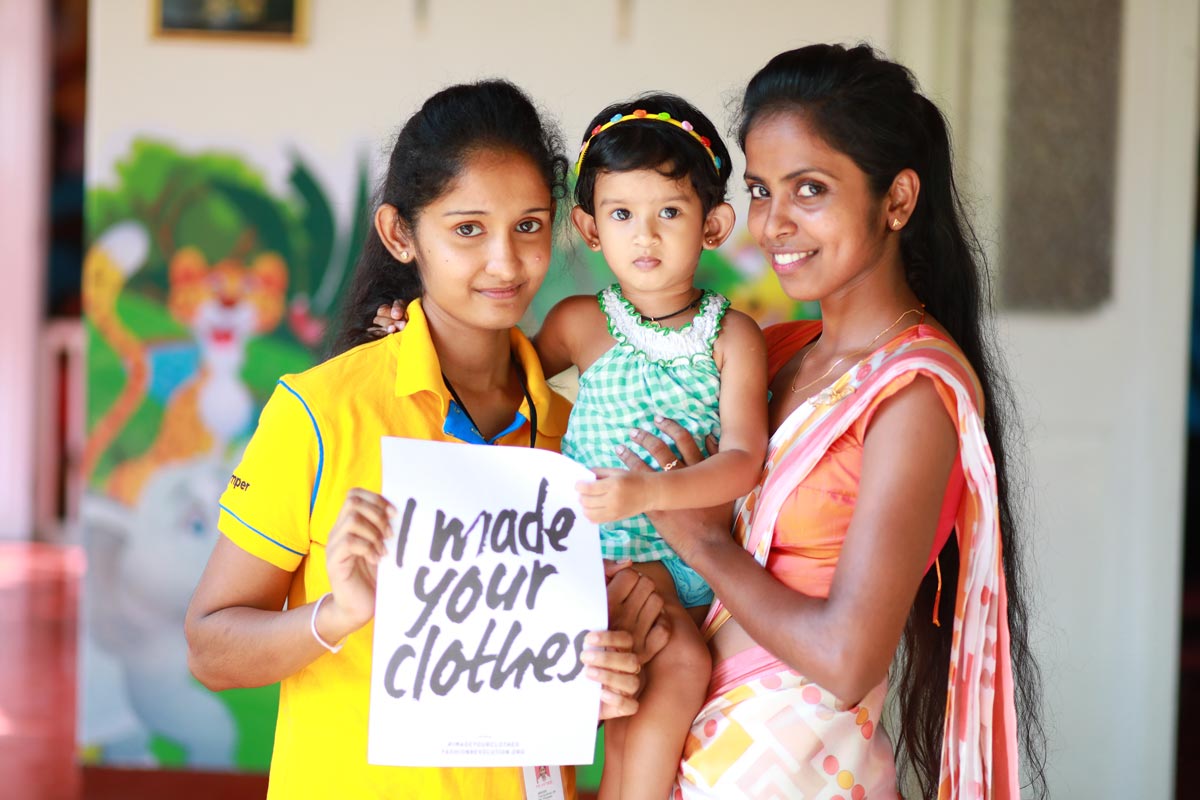
The Plan For Change also strives to foster diversity and inclusion, ensure and elevate sustainable compensation, accelerate employee well-being & work-life balance, and provide world-class working conditions for all employees, as well as enable positive impact in all communities. For MAS, a positive work environment means an inclusive one; since its early stages of business, MAS has supported employees with disabilities and currently employs 380 persons with disabilities ranging from vision, speech, hearing, and cognitive to physical impairments. It applies the 4E model (Employ, Enable, Engage, and Empower) for employees with disabilities and provides training to non-disabled employees such as the ‘Talking Hands’ initiative which trains non-impaired employees in sign language to promote an integrated and inclusive workplace. After seeing many local businesses suffer as a result of the COVID-19 pandemic, MAS launched Rise Up with MAS which financed micro-businesses within localities where the company operates, to mitigate the adverse impacts of the pandemic and allow for the entrepreneurs to restart or expand their businesses.
Planet
Knowing it operates in an industry with a large negative impact, MAS has committed to reduce absolute scope 1 and 2 GHG emissions 25.2% by 2025 from a 2019 base year. The goal is in line with the 1.5°C target outlined in the Paris Agreement and was recently accepted by the Science Based Target initiative (SBTi). Additionally, MAS has committed to value enhance (upcycle) 100% of non-hazardous waste, be zero toxic in all products and processes, safeguard water, and restore biodiversity in 100x the space it occupies.
To partially address emissions reduction, Project Photon, a multi-roof solar panel initiative started in 2017, was implemented. Currently, 48,000 solar panels cover 18 MAS facilities, contributing to 57% renewable energy usage across its global operations. As part of its goal to value enhance waste, MAS has created Eco-Brick at MAS Fabric Park, which converts textile sludge to bricks, as a way of addressing the problem of ETP sludge and effluent waste within MAS while simultaneously providing building materials for the company.
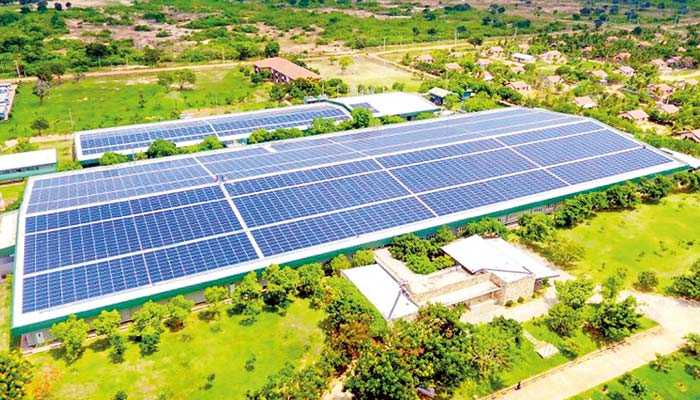
Currently, 98% of the chemicals the manufacturer uses are compliant with the ZDHC’s Level 1 MRSL, bringing MAS closer to its goal of zero toxicity by 2025. MAS has also begun work on its commitment to restoring biodiversity in 100x the space it occupies, equating to 25,000 acres. Forty-five habitat restoration projects such as aerial reforestation, invasive removal and restoration, and analog forestry have been carried out across Sri Lanka, accounting for 2551 acres restored as of 2020.
MAS is determined to make sustainable and ethical strides by 2025 and the challenges of 2020 have not impeded MAS’ vision for a more sustainable and equitable future. By implementing this company-wide strategy, MAS Holdings aims to have a large-scale positive impact on products, lives, and the planet changed for good.
MAS Holdings
MAS Holdings, the largest apparel tech company in South Asia, is among the most recognized design-to-delivery solution providers in apparel and textile manufacturing. Home to a community of over 100,000 people, today, MAS spans across manufacturing plants in 15 countries, with established design locations placed in key style centres across the world. Catering to the demands of a dynamic and ever-changing industry, the MAS portfolio has expanded exponentially; into brands, wearable technology, FemTech, start-ups and fabric parks worldwide.
Over 30 years of operations, MAS has gained global recognition for its ethical and sustainable working environment and for the organization’s tireless efforts in social development and women’s empowerment. Product excellence and craftsmanship have placed MAS on the world map as an industry leader, showcasing unfailing delivery in innovative manufacturing and design. Today, the company’s efforts to drive positive impact are outlined in the MAS Plan for Change, a commitment to create sustainable change under three areas of focus: products, lives, and planet. Through these initiatives, MAS aims to inspire all employees to be changemakers, enabling dreams and enriching the fabric of life on our planet.

Subscribe To Our Newsletter
Join our mailing list to receive the latest news and updates from our team.


